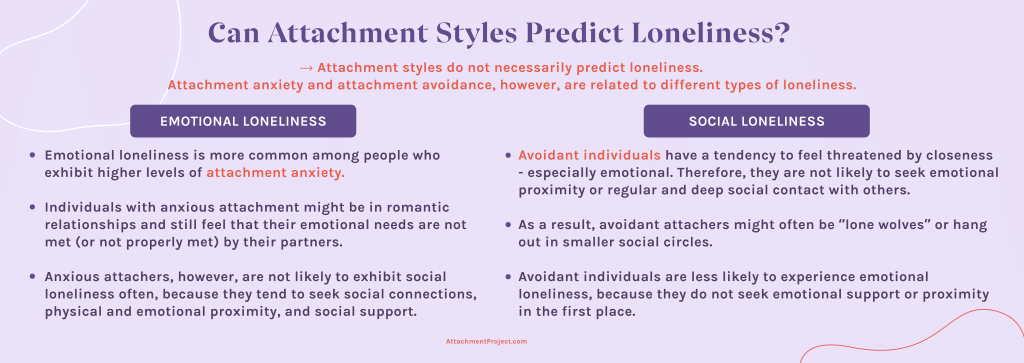Can Attachment Styles Predict Loneliness? The Role of Emotional Needs

Published on December 12, 2021 Updated on June 14, 2023
In this blog post, we investigate the link between attachment styles, emotional needs, and loneliness. While insecure attachment does not necessarily predict loneliness, studies demonstrate that unmet emotional needs seem to lie at the heart of both attachment insecurity and loneliness.
Loneliness is a feeling we all have at some point in our lives. Britney Spears said it best:
She’s so lucky, she’s a star; But she cry, cry, cries in her lonely heart thinking, “If there’s nothing missing in my life, then why do these tears come at night?”
Britney Spears – “Lucky”
Britney has a point; loneliness doesn’t just come to those who are alone. It also comes to anyone who experiences a dissonance between what they expect and desire their relationships to be like, and what those relationships are actually like.
Loneliness is a great concern in the field of mental health, for one because it can be so common, but also because it can lead to greater mental health issues.
In this blog post, we’ll explore:
- How is loneliness defined in academic literature?
- What is the difference between emotional and social loneliness?
- Does insecure attachment cause loneliness?
- Why are emotional needs the core of both insecure attachment and loneliness?
- Which attachment styles are prone to which types of loneliness?
- How does loneliness affect our mental health?
What Is Loneliness?
Loneliness occurs when there’s a discrepancy between the emotional needs for belonging, proximity, love, and affection and how these needs are met through our relationships.
This discrepancy can arise in all types of relationships, and on a social and emotional level. Whereas social loneliness is when someone is isolated from others or is physically alone, emotional loneliness is when a person can be surrounded by people but still feels lonely. It is this emotional form of loneliness that Britney was describing in her song, Lucky.

For example, a parent-child relationship where the parent has an avoidant attachment style and does not respond readily to the child’s emotional needs can cause the child to feel emotional loneliness. This form of loneliness manifests similarly in friendships and romantic relationships.
On the other hand, social loneliness is typical for people who are far away from their families and friends, such as in cases of immigrants in new and unknown cities.
How Is Loneliness Related to Attachment? – The Role of Emotional Needs.
Research on the relationship between loneliness and attachment styles is both extensive and overarching. The consistent main link between the two is that they both develop on the basis of unmet emotional needs.
Loneliness occurs when one’s relationships do not fulfill certain emotional needs; and, similarly, insecure attachment forms when the caregivers do not consistently meet the infant’s emotional needs (which we commonly refer to as the five conditions for secure attachment).
Relationships, Attachment, and Loneliness

Research has suggested that young adults are more prone to experiencing emotional loneliness due to changes in the child-parent relationship, as well as changes regarding what they require from the important people in their lives at this stage in their development.
Studies have found that peer attachment also strongly influences whether we experience loneliness. Some studies have even shed light on the possibility that parents and teachers assess lonely teenagers as less socially adjusted, and whether this can result in poorer academic results.
The connection between attachment and loneliness is also prevalent in romantic relationships.
Attachment Avoidance & Social Loneliness
Studies have found that avoidant attachers are less likely to date or seek relationships. In other words, they are more prone to having smaller social circles and, thus, may stay single for longer periods of time. Avoidant attachers are thus more susceptible to social loneliness and isolation.
Even when avoidant attachers do engage in dating and relationships, those relationships are usually casual and short-lived.
Avoidant attachers tend to feel threatened by emotional intimacy and use various defense mechanisms. They typically exaggerate their qualities and positive attributes and minimize their weaknesses and limitations. They might also feel extremely defensive and distressed when their partners bring light to their imperfections and flaws.
On the other hand, avoidant attachers might look down on their partners and be quite critical of them. Such behaviors might make it difficult for avoidant individuals to maintain long-lasting relationships. In some cases, the avoidant attacher might even (subconsciously) sabotage the relationship.
Attachment Anxiety & Emotional Loneliness
Unlike avoidant individuals, people with an anxious attachment style are more likely to seek relationships, thus avoiding social loneliness.
However, anxious individuals tend to seek and even rely on emotional support from and closeness to their partners. People high on attachment anxiety might become emotionally dependent on their partners, needing regular validation, reassurance, and physical contact in order to feel loved and accepted.
A problem arises, however, when the partner is not able to meet those emotional needs – due to being unaware of them or feeling pressured or suffocated by them. In both scenarios, the anxious individual ends up feeling lonely and deprived on an emotional level.
Anxious attachers in a relationship are prone to exhibiting more emotional loneliness. In addition, they tend to feel a greater sense of emptiness and emotional loneliness when a relationship ends. This, once again, can be attributed to anxious people’s tendency to become emotionally dependent on their partners.

How Does Loneliness Affect Mental Health?
Loneliness is a completely normal and inevitable part of life – as everyone likely experiences it at some point. Nevertheless, it could potentially reach a pathological level and begin to affect our mental and physical health more seriously.
1. Loneliness Can Harm Your Self-Esteem

The most prominent and consistent finding in research on the link between loneliness and mental health is how isolation impacts self-esteem. That is, people who experience loneliness will also commonly experience low self-esteem.
Lonely individuals feel that they are inferior to others, or unworthy of others’ love and attention.
This is especially the case for anxious attachers because they are already prone to having negative views of themselves. Social and emotional loneliness can amplify those negative views.
Anxious attachers’ negative self-image might cause them to have negative expectations of themselves in relationships, too. As a result, the anxious individual might have actual problems in social contexts, lose friendships and partners, and experience even stronger loneliness.
2. Loneliness Can Cause Anxiety
Anxiety relates to both social and emotional loneliness. On the one hand, socially lonely people will likely become restless and anxious until they see others. They might even become anxious at the thought of seeing others after long periods of being alone.
On the other hand, emotionally lonely people may be anxious that their existing relationships are not meeting their emotional needs.
3. Loneliness: A Bridge Between Insecure Attachment and Mental Health Issues?
Across many studies, insecure attachment styles have a link to common mental health concerns, including depressive symptoms, anxiety, and substance abuse.
Interestingly, research supports the idea that this relationship is actually mediated by loneliness. To put it simply, loneliness is a factor that might explain why people with insecure attachment styles exhibit certain mental health issues. For example, one such study found that students with a mixed (which we refer to as disorganized) attachment style demonstrate a higher tendency of experiencing depressive symptoms, and these symptoms are mediated by loneliness.
4. Loneliness Can Impair Your Ability to Deal with Distress

Many studies support the idea that people with insecure attachment are less likely to cope healthily with distress. This is a topic we’ve discussed thoroughly in our blog posts on self-regulation for anxious, avoidant, and disorganized attachers.
Nevertheless, loneliness seems to add to that equation as well. Studies demonstrate that loneliness prevents insecure attachers from restoring their psychological well-being as fast or as efficiently as people with secure attachment.
And as we discussed in a previous section (earlier in this blog post), insecure attachers are more likely to experience loneliness. Avoidant attachers are prone to feeling socially lonely, whereas anxious individuals have a tendency to exhibit emotional loneliness.
Taken together, this shows that insecure attachers are not only more likely to exhibit psychological distress, but they are also more likely to feel loneliness, which further hinders their abilities to restore their emotional state quickly after the experience of distress.
Conclusion: The Importance of Emotional Needs
It seems that of the most important things to consider when thinking about the relationship between loneliness, attachment styles, and mental health, is that, in order for us to develop and maintain a healthy and balanced mental state, our social and emotional needs must be met.
If you suspect that this is often not the case for you, remember that it’s not too late to change that! Even though we have gone through some difficult – even perhaps distressing – information in this post, it is important to keep in mind that discovering and admitting our issues is the first step to healing.
If you suspect that you might exhibit high levels of attachment anxiety or avoidance, don’t hesitate to take our free attachment style quiz and find out – in just 5 minutes!
Attachment styles are in no way damning for our mental health. However, they are contributing factors to consider, and recognizing these can be extremely helpful in a therapeutic context. When in doubt, always contact your physician or therapist for further clarifications and advice.
References

Bogaerts, S., Vanheule, S., Desmet, M. (2006). Feelings of subjective emotional loneliness: an exploration of attachment. Social Behavior and Personality: an international journal, 34(7): 797-812.
Heinrich, L.M., Gullone, E. (2006). The clinical significance of loneliness: A literature review. Clinical Psychology Review, 26(6): 695-718.
Mikulincer, M., Shaver, P.R. (2013). An Attachment Perspective on Loneliness, Chapter 3 in eds. Coplan, R.J., Bowker, J.C., The Handbook of Solitude: Psychological Perspectives on Social Isolation, Social Withdrawal, and Being Alone: 34-50.
Nottage, M. K., Oei, N. Y., Wolters, N., Klein, A., Van der Heijde, C. M., Vonk, P., … & Koelen, J. (2022). Loneliness mediates the association between insecure attachment and mental health among university students. Personality and Individual Differences, 185, 111233.
Wei, M., Shaffer, P. A., Young, S. K., & Zakalik, R. A. (2005). Adult Attachment, Shame, Depression, and Loneliness: The Mediation Role of Basic Psychological Needs Satisfaction. Journal of Counseling Psychology, 52(4): 591–601.











 Get mental health tips straight to your inbox
Get mental health tips straight to your inbox








